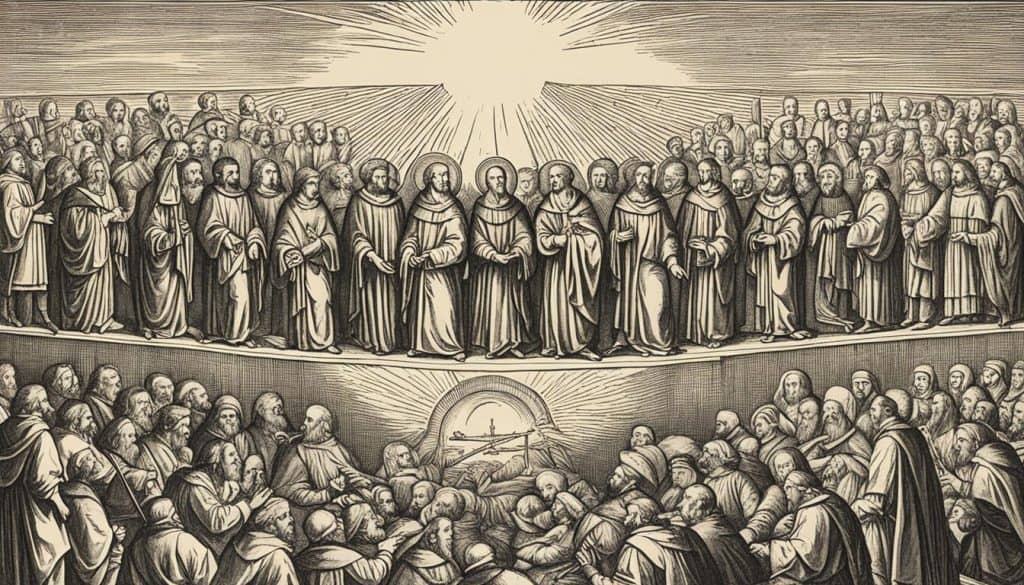Have you ever thought about if your life was planned before you were even born? The idea of predestination makes us think deeply about our salvation and purpose. This guide will look at how Christianity sees predestination, where God has chosen some for salvation. It’s a complex idea that affects our beliefs about faith and God’s control, making us wonder about our free will and destiny.
Starting to understand predestination takes us back to the Bible and its impact on Christian beliefs. By looking into this idea, you’ll learn how it shapes our faith and connection with God. Let’s dive into the details of this deep theological topic together.
What is Predestination?
Predestination is a deep dive into the divine plan. You might ask, what is predestination? It’s the belief that God has set the fate of every person, especially about their salvation. This idea shows God’s control and knowledge in picking who will get eternal life.
The biblical definition of predestination says God, with His all-knowing, has a plan for humanity. Different views on this lead to many beliefs within Christianity.
Predestination’s importance comes from its effect on how we see God’s role in saving us. It can make believers feel secure, knowing their salvation is part of a plan, not just luck. But, it also brings up questions about free will and our choices, making us wonder if we can choose faith or salvation.
| Theological Perspective | Definition | Key Emphasis |
|---|---|---|
| Calvinism | God’s unconditional election of certain individuals to salvation. | Divine sovereignty over human destiny. |
| Arminianism | God’s foreknowledge allows for human free will in accepting salvation. | Cooperation between divine grace and human choice. |
| Lutheranism | God’s decision to save individuals based on His mercy. | Assurance of salvation through faith alone. |
Historical Context of Predestination
The historical context of predestination shows how this idea changed over time. Early church leaders like Augustine played a big role. They believed in God’s total control and the power of grace. This set the stage for later debates on predestination.
Over the years, many events changed how people saw predestination. The Protestant Reformation brought big changes. Reformers like Martin Luther and John Calvin stressed God’s power in saving people. They made the idea of being chosen by God and predestination even stronger.
Looking into this topic, think about how society and theology affected predestination’s views. The Middle Ages and the Renaissance brought many different opinions. These views helped shape how we understand predestination in Christianity today.

Biblical Foundations of Predestination
The Bible teaches us about predestination and God’s control over everything. The Apostle Paul talks about this in his letters. He explains how God picks people for salvation before anything happens.
Pauline Epistles and Key Passages
Paul says God has a plan for saving us. He shows that predestination comes from God’s will. In Ephesians 1:4-5, he talks about how God chose us to be holy and blameless.
This choice wasn’t random. It was a thoughtful act based on God’s wisdom.
Understanding Romans 8:29-30
Romans 8:29-30 is key to understanding predestination. Paul says God knew us before and chose us to be like His Son. This shows how God planned our salvation from the start.
This shows God’s active role in saving us. It strengthens the idea of predestination in the Bible.
| Passage | Key Concept | Theological Implication |
|---|---|---|
| Ephesians 1:4-5 | Chosen for Holiness | God’s sovereign selection emphasizes purpose in salvation. |
| Romans 8:29-30 | Foreknowledge and Glorification | Links God’s foreknowledge with predestination highlights His active role. |
Predestination in Romans
Exploring predestination in Romans reveals deep insights into God’s sovereignty and His choices. It shows how God picks people for salvation and highlights the balance between mercy and justice. This balance is especially clear in Romans 9:15-18. By looking into these ideas, you can better understand Paul’s teachings and what they mean for believers.
God’s Sovereignty and Choice
Romans sheds light on God’s sovereignty through Paul’s words. This idea of predestination is key to understanding God’s will. God chooses some people and not others, showing His complete control over salvation. His choices are based on His wisdom, not on what people do or want.
Mercy Versus Justice in Romans 9:15-18
Romans 9:15-18 shows how mercy and justice work together in God’s plan. God says, “I will have mercy on whom I have mercy,” showing His mercy is a choice, not a must. These verses make us think about fairness and righteousness. They help us see the depth of God’s character and how it guides His choices in predestination.

Ephesians and Chosen by God
In the epistle to the Ephesians, Paul shares a powerful view on being chosen by God. This idea comes from Ephesians 1:4-5. It says believers were picked by God’s grace even before they were born. This changes how we see predestination and our role as God’s children.
Exploring Ephesians 1:4-5
Ephesians 1:4-5 says, “For he chose us in him before the creation of the world to be holy and blameless in his sight. In love, he predestined us for adoption to sonship through Jesus Christ.” This shows us that believers weren’t just an afterthought. We were meant to be adopted as God’s children from the start. Being connected to Christ is key to our spiritual journey.
Destined for Adoption as God’s Children
Knowing you’re destined for adoption shows a deep truth: your identity as a Christian is part of God’s plan. This selection creates a bond with God that goes beyond what we can understand. Being chosen by God means you’re part of His family, filled with His love and purpose for your life.

| Concept | Description |
|---|---|
| Chosen Before Creation | Believers were selected by God prior to the foundation of the world. |
| Purpose of Selection | To be holy and blameless in His sight. |
| Adoption as Sons | Believers are adopted into God’s family through Jesus Christ. |
| Significance of “In Him” | Indicates a vital connection with Christ that shapes your identity. |
Different Perspectives Within Christianity
The debate on predestination has many views within Christianity. Calvinism and Arminianism are two main sides. They shape how people think about salvation and our choices.
Calvinism and Double Predestination
Calvinism talks about double predestination. It says God has chosen some for salvation and others for condemnation. This idea shows God’s power and the need for grace to be saved. Calvinists believe God makes all choices, not us.
This view leads to deep talks about fairness and mercy in God’s plan.
Arminianism and Emphasis on Free Will
Arminianism, on the other hand, puts a lot of weight on our free will and God’s knowledge. It says God’s grace lets us choose to accept or reject salvation. Arminians believe God knows who will choose Him, but He doesn’t force it on us.
This view makes salvation seem more like a personal choice. It adds depth to the debate on predestination.
The Book of Acts and Predestination
The Book of Acts gives us deep insights into predestination, especially in the early church. Acts 13:48 is a key verse that shows how early believers saw their faith and God’s control. It tells us how believing in being chosen for eternal life changed their beliefs and actions.
Acts 13:48: Ordained to Eternal Life
Acts 13:48 says, “as many as were ordained to eternal life believed.” This statement connects predestination with faith. It shows that believing wasn’t just by chance but by God’s plan. This idea is a key part of the Book of Acts and understanding predestination.
| Element | Description | Importance |
|---|---|---|
| Ordained to Eternal Life | Divine calling where certain individuals are chosen for salvation. | Asserts the sovereignty of God in saving believers. |
| Context of Acts 13:48 | Early church’s response to the Gospel among Gentiles. | Illustrates how predestination impacted the spread of the Gospel. |
| Faith and Belief | The response of those ordained to eternal life. | Demonstrates how belief follows divine initiative. |
Understanding being chosen for eternal life changes how we see our faith and the church’s mission. It shows how God’s plan helped the early church grow. This idea links predestination with the story of Christianity.

Understanding Predestination and Free Will
The debate over predestination and free will is a big topic in theology today. Some believe God has already decided our fate. Others think we can make our own choices. This brings up questions about God’s power and our own choices.
Many experts say these ideas can work together. They believe God knowing our choices doesn’t take away our freedom. Instead, it helps us understand how God guides us in our decisions.
But, some worry that believing in predestination could mean we’re not really free. They think if everything is set, then choosing isn’t real freedom. This view makes us think about what it means to be responsible and accountable.
Thinking about these ideas can change how you see faith and your connection with God. Looking into predestination and free will can give you new insights into God’s nature and your place in His plan.
Practical Implications of Predestination
The idea of predestination has deep effects on those looking to deepen their faith. It changes how you see your impact on faith and worship. It makes you think differently about grace and justice in your daily spiritual life. This view helps you understand God’s power and how He relates to us.
Impact on Faith and Worship
Knowing about predestination changes how you worship and believe. It makes you think about how grace changes our beliefs. When you think about predestination, consider these points:
- Gratitude becomes a key part of worship, showing God’s favor without reason.
- Understanding justice helps guide how we worship, making it more in line with the Bible.
- Having deeper faith leads to confident worship, without worrying if you’re good enough.
Developing a Personal Relationship with God
Embracing predestination deepens your relationship with God. It builds trust in His plan for you. Building this relationship is crucial, as it gives you a sense of security as part of God’s family. Think about these points:
- Talking to God in prayer strengthens your bond and trust in His will.
- Studying the Bible helps you understand God’s plans and boosts your faith.
- Being part of a community shares experiences of God’s grace with others.
These ideas show how predestination affects not just individual faith but also how we worship together. Exploring these ideas can deepen your understanding of living by faith under God’s guidance.
Historical Debates Surrounding Predestination
Predestination has been a big topic in Christian thought for a long time. Different views on it have led to many theological debates. These debates show the wide range of beliefs within Christianity. They help us see how predestination affects different theological ideas.
The Synod of Dort and Its Influence
In the early 1600s, the Synod of Dort was a key event in the predestination debates. It was called to address the Arminian movement. The synod made it clear what Reformed churches believe about predestination.
It said God chooses people for salvation without looking at their good deeds. The Canons of Dort came from this synod. They became a key part of Reformed theology, affecting beliefs in many churches.
Predestination’s Impact on Theological Doctrines
Debates about predestination have shaped many theological ideas. The Synod of Dort’s views helped create important statements of faith. These statements talk about how we’re saved and God’s power.
As different groups looked at these ideas, they came up with their own views. This has made theology more complex and interesting. It shows how debates on predestination still affect how we think about faith and salvation today.
Reassurance of Salvation Through Predestination
The idea of predestination is a key part of faith for many. It gives a deep sense of security about being saved. Knowing that God’s plan is set in stone makes you more confident in your faith. It shows that you have a special role in God’s plan, making it clear what it means to be saved.
Finding Comfort in God’s Eternal Will
Thinking about predestination and salvation brings a lot of comfort. It means God is in charge, which helps you deal with life’s ups and downs. Here are some key points to consider:
- God’s unyielding promise: You can be sure your salvation is safe, no matter what happens.
- Understanding divine purpose: You learn that God has a plan for you, even through tough times.
- Enhanced spiritual growth: Believing in predestination helps you connect more deeply with God.
Understanding predestination brings a deep peace. You know that God’s plan covers every part of your life. He guides you in ways you might not even see.
How Does the Concept of “God is Light” Relate to Predestination in the Bible?
The concept of “God is light” signifies purity, knowledge, and divine truth, illuminating the way for humanity. In terms of predestination, God’s light exposes His ultimate plan for the world, guiding those He’s chosen. Understanding the meaning of god is light helps reconcile divine direction with the mysteries of predestination.
Challenges in the Interpretation of Predestination
The journey through the biblical texts on predestination is complex. Believers face challenges in understanding God’s plans for humanity. They try to make sense of different theological views on predestination.
This leads to a mix of teachings and interpretations. It can be confusing. Exploring the scriptures requires careful study and thought.
When you look into the scriptures, you’ll see different beliefs on predestination among denominations. This calls for careful study and contemplation. By deeply engaging with the texts, you can grasp God’s plans for salvation.
Dealing with predestination is more than just an intellectual exercise. It deeply affects your faith and relationship with God. By understanding the complexities of these texts, you gain a deeper insight. This can lead to a stronger connection with the themes of grace and purpose in your spiritual life.

